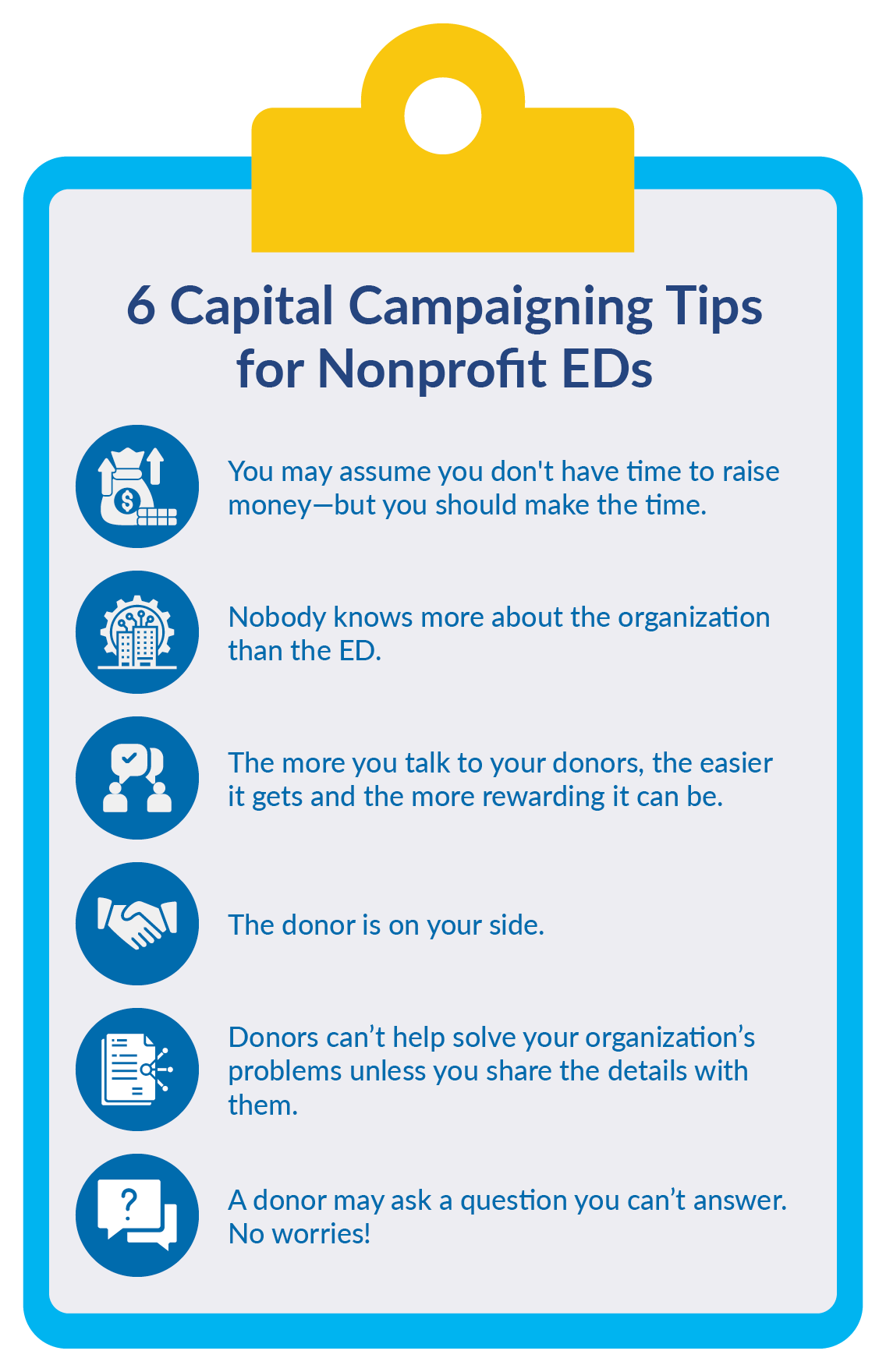Surviving a Capital Campaign: Tips for Executive Directors

The following is a guest post from by Andrea Kihlstedt from Capital Campaign Toolkit.
Picture this: Janet is an amazing nonprofit executive director (ED). There’s no pressing problem, delicate strategy, or multi-layered project she can’t tackle and tame. She’s been with her nonprofit since the beginning and knows everything there is to know about her organization and will do what it takes to get the job done.
But there’s one task Janet would really rather not even think about: capital campaign fundraising.
Not all EDs have the experience or even the desire to become strong fundraisers. After all, the prospect of sitting eye-to-eye with a donor and asking for money can be daunting or even downright terrifying. Plus, adding fundraising and navigating charitable solicitation compliance to an ED’s overflowing to-do list can be a big ask.
However, the reality is that if your nonprofit is ready for a campaign, it’s time to jump in with both feet. Recent research has shown that campaigns come with a wealth of benefits (on top of the money raised), such as strengthened major donor relationships, boosted board engagement, and even improved fundraising skills and systems. Plus, a whopping 94% of organizations consider their capital campaigns to be successful.
So, if you are worried about how you can get on the path to capital campaign success, even if your shortcomings as a fundraiser have you worried, you’re in the right place. This post is for the EDs who find themselves reluctantly standing on the capital campaign frontlines. Read on to learn that you’re not alone in your trepidation and that there are ways to get the job done.
A Story from the Real World: Handling the ED Role in the Midst of Capital Campaigning
Xan Blake, a Capital Campaign Pro adviser and past ED herself, has walked this walk, landing her first ED job right in the middle of an ongoing campaign.
“I learned fast that as an ED, you really are a key part of your nonprofit’s success. You might want to, but you can’t look away,” she says. “There are a lot of things you don’t want to do as an ED. But we do them. We don’t want to grapple with government regulations and compliance, but we do. We didn’t want to manage through COVID, but we did.”
The ED can and should be a critical part of a successful campaign. Who knows more about the inner workings, the successes, and the needs of their nonprofit? Who better than the ED, who keeps the entire operation going, to play an outward-facing, fundraising role?
For EDs, the key is to tackle their campaign role as they would their administrative role: with honesty and sincerity.
Blake tells the story of an ED she once counseled who was so shy about asking a donor for money, he just couldn’t overcome his fear.
“I knew he could turn shyness into respect,” she says. She suggested a technique she had learned from Capital Campaign Pro co-founder Amy Eisenstein. “[Amy] says that if you’re really nervous, just say to the donor that this really makes you nervous, that you have never asked anyone for a gift of this size before.
“Then say, ‘So, I’d like to ask you for a gift of $100,000, and I want to ask what you think about that.’” Her client used this technique over and over, and his nonprofit exceeded the campaign goal. “He didn’t get over it,” Blake says. “He got through it. He figured out how to work it, how to use it.”
Honest. Sincere. Effective. That’s an approach that rarely fails, even if you make some mistakes along the way. In fact, Blake says, 75% of in-person solicitations result in a gift.
6 Tips for Effectively Leading Your Capital Campaign
If you get that dreaded call asking you to help lead a capital campaign and actively fundraise, fear not. Here are six tips we know will help:

- You may assume you don’t have time to raise money—but you should make the time. Look at it this way: The time you invest in meeting with donors will return in ways you can’t even imagine yet. When you need information in the future, they will take your call. When you have a new idea, they will listen. Face-to-face fundraising during the campaign’s quiet phase is time well spent!
- Nobody knows more about the organization than the ED. A donor may not care about every part of your capital campaign, but your words could bring a proposed new program to life for them. Put plenty of careful thought into your campaign’s case for support and associated materials so that you can lean on them to tell your story later.
- The more you talk to your donors, the easier it gets and the more rewarding it can be. To make the conversations flow better and feel more sincere for both parties, speak from your heart.
- The donor is on your side. They may test you a bit, but they want you to succeed. Your insider knowledge can lead them to a gift that’s meaningful to them and touches their heart. Bring your passion for the work to the meeting.
- Donors can’t help solve your organization’s problems unless you share the details with them. EDs know to the penny what works and what doesn’t. As Blake puts it, a little vulnerability can go a long way.
- A donor may ask you a question you can’t answer. No worries! Tell them you don’t know—but that you’ll find out and get back to them. Promising to chase down a detail not only shows respect and responsiveness but also gives you a chance to reconnect.
When all is said and done, participating as an ED in your organization’s capital campaign could actually make your work easier.
While you’re talking to and engaging your donors, make sure you are listening for ideas, suggestions, and questions that lead to new answers. Listen to their complaints, as well. It’s not fun, but it can help highlight needed changes beyond the campaign.
If a capital campaign falls in your lap, here are some great resources for you:
- It never hurts to call friends/fellow EDs who have cleared the capital campaign hurdle.
- Ask for help. There are ways your board and top executives can help get you into a donor-meeting comfort zone.
- Search for blogs and other digital resources from those who have been there, like your friends at Capital Campaign Pro!
Capital campaigns are daunting—it’s no wonder you’re feeling a little overwhelmed at the prospect of stepping into such intensive fundraising work. However, if you remember that other EDs have been in your same position and you apply the tips above, you’ll find that capital campaign fundraising can be a positive experience for both you and your donors.
Is your organization ready for a capital campaign? Capital Campaign Pro’s simple assessment tool will help you find out. You’ll assess six key areas of your organization. Take this free assessment now and find out if you’re truly ready for a campaign.
 Andrea Kihlstedt is a Co-Founder of the Capital Campaign Toolkit. She is the author of Capital Campaigns: Strategies that Work, now in its 4th edition, as well as How to Raise $1 Million (or More) in 10 Bite Sized Steps, in addition to other books. Andrea has been leading successful capital campaigns for more than 30 years. To learn how the Capital Campaign Toolkit can support you through a capital campaign, visit capitalcampaigntoolkit.com.
Andrea Kihlstedt is a Co-Founder of the Capital Campaign Toolkit. She is the author of Capital Campaigns: Strategies that Work, now in its 4th edition, as well as How to Raise $1 Million (or More) in 10 Bite Sized Steps, in addition to other books. Andrea has been leading successful capital campaigns for more than 30 years. To learn how the Capital Campaign Toolkit can support you through a capital campaign, visit capitalcampaigntoolkit.com.
who subscribe to our free, email newsletter. It’s information that will empower your nonprofit!
Comments (3)
Comments are closed.

I am a selfdriven person and conflict absorbed with meaningful strategies to settle a conflict of interest situation
Hello
I believe this is the 2nd time I am writing this letter, my name is Charles Mazeze, I am the CEO of a non-profit organization called Alarm Ministries.
Alarm Ministries operating in Rwanda, DRC and USA, USA, we have documents that allow us to work openly, but we need people to work with us and help us achieve the big goals we have set ourselves to achieve.
we want to help the people of the world and our region of Africa
If you need more information to know Alarm Ministries, I am ready to give it to you.
Charles
Chairman
Hi Charles,
We apologize for missing your first request. Please give our office a call at 615-361-9445 at your convenience to see if we can be of assistance.